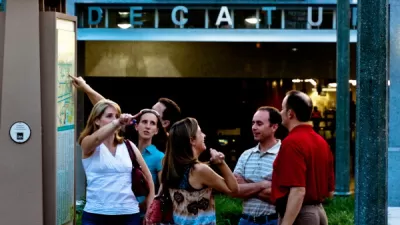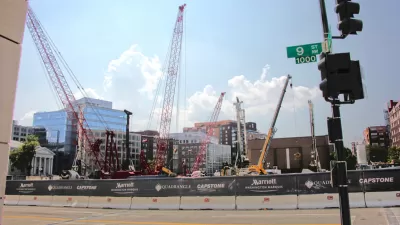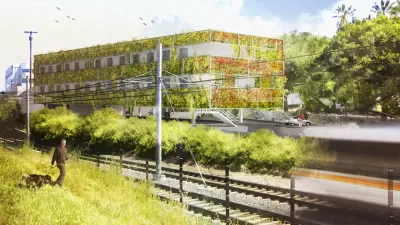Research
Study: The Parking Tax Benefit Subsidizes Congestion
A new report, "Subsidizing Traffic Congestion: The Multibillion-Dollar Tax Subsidy That’s Making Your Commute Worse," was released earlier this week by TransitCenter and Frontier Group.
Self-Cooling Walls Take Climate Control Off the Grid
With anticipated rising global temperatures, the need to cool our homes will take a massive toll on our electrical grid, which a team of masters students aims to address with their new wall insulation.
Scientists Pick up Seismic Vibrations from Human Transportation
For the first time, researchers were able to detect the vibrations created by human transportation systems.

Majority of Americans Favor Funding for Transit Over Funding for Roads
In a poll conducted by ABC News and the Washington Post, Americans were found to prefer allocating transportation funding towards transit expansion rather than road widening.
Rethinking the Spectrum of American Multi-Modality
A new study from Virginia Tech reclassifies what defines multi-modal commuters.

Is Urban Revitalization Possible Without Displacement and Gentrification?
Jared Green asks the billion dollar question for economic developers and planning agencies throughout the United States: is urban revitalization of neighborhoods possible without the subsequent gentrification and displacement of current residents?
Study Rates Car 'Infotainment Systems' for Levels of Distraction
A study conducted by the AAA Foundation for Traffic Safety assessed the mental demands required of six hands-free, in-vehicle systems dialing phones and changing radio stations.
Millennials in Government
A new report on millennials working in the federal government was released earlier this week by the U.S. Office of Personnel Management, detailing the trends associated with this young generation of employees.
Survey Illuminates American Mayors' Priorities
A new study conducted by former Boston Mayor Tom Menino and the Initiative on Cities at Boston University surveyed 70 mayors on their challenges, policy agendas, and relationships.
Neuroscience and Landscape Architecture
Two new studies use EEG and fMRI to pinpoint which elements of urban parks and gardens induce brain activity associated with meditative states.
A New, Flexible System for Congestion Pricing
Researchers at MIT have developed a new, flexible congestion pricing system.
Report Reveals Imbalanced Investments for Atlanta's BeltLine
While the neighborhoods on northern segments of the Atlanta's BeltLine has received 94 percent of funding invested towards parks and trails, segments to the south have received 86 percent of affordable housing investments.

Self-Starter Urbanism: Small Firms Tackle Big Projects on Their Own Terms
Development and research projects allow small firms entry into large-scale design.
Matching Urban Nature to Community Values
Researcher Chris Ives suggests that rather than relying solely on economic gains to justify urban nature and biodiversity, community values may be more effective in gaining public support.

Keeping Up with the Field: Computerized Tools for Tracking Research and New Ideas
Urban planning professionals and researchers increasingly face information overload. Todd BenDor and Rob Goodspeed suggest three techniques for strategically monitoring the web for new research and ideas.
Can Narrow Lanes Improve Traffic Congestion?
Comparing wide versus narrow lanes, Kenneth A. Small and Chen Feng Ng examine the relatively unexplored design of building more compact roads to alleviate traffic congestion.
Is Any City Truly Unique?
As new research data on cities pours in daily, interesting patterns emerge regarding income, green space and urban growth. Like people in their genetic make-up, are cities fundamentally all the same?
Choosing Ignorance is Stupid
People love statistics. They let us understanding the world beyond our own senses. USA Today publishes a daily Snapshot which presents a graph of random statistics. Sports talk and business analysis are dominated by statistics. We measure our progress, or lack thereof, and compare ourselves with others, based on statistics about our size, activities and accomplishments.
Pedestrianology 101: The Science of Walking in Social Spaces
In the second part of a four part series on America's pedestrian problem, Tom Vanderbilt evaluates the surprisingly formalized field of pedestrian behavior research, from navigating crowded sidewalks to tripping at the bottom of the stairs.
Why Are You Walking So Fast?
Eric Jaffe examines research on just what it is that makes people walk faster in New York than, say, Fargo, North Dakota.
Pagination
Urban Design for Planners 1: Software Tools
This six-course series explores essential urban design concepts using open source software and equips planners with the tools they need to participate fully in the urban design process.
Planning for Universal Design
Learn the tools for implementing Universal Design in planning regulations.
Caltrans
Smith Gee Studio
Institute for Housing and Urban Development Studies (IHS)
City of Grandview
Harvard GSD Executive Education
Toledo-Lucas County Plan Commissions
Salt Lake City
NYU Wagner Graduate School of Public Service


































